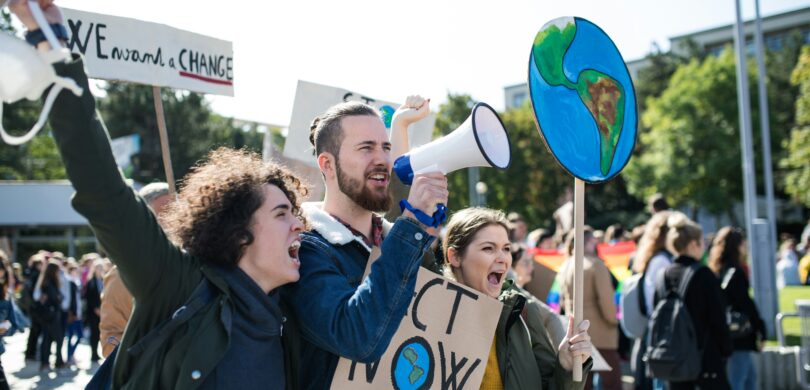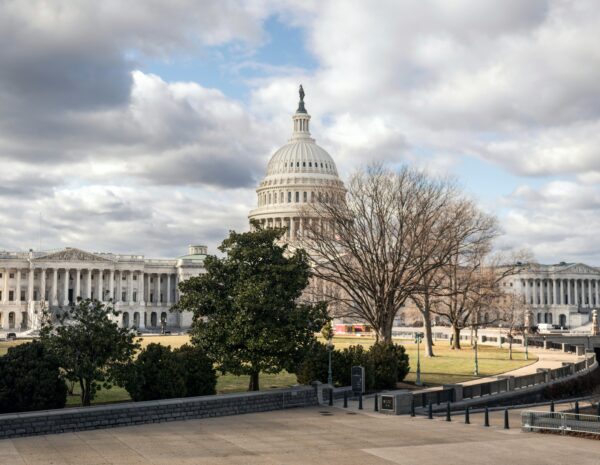The two major party candidates in the 2024 presidential election hold vastly different views on climate change and what should be done about it.
President Joe Biden has authorized unprecedented federal funds and enacted a flurry of rules to fight climate change. Vice President Kamala Harris, the new Democratic nominee, is committed to climate change as a key issue and hopes to continue Biden’s momentum on the issue. Meanwhile, if elected, former President Donald Trump aims to undo as much of it as he can. Trump has promised to get rid of what he sees as wasteful spending and burdensome regulations.
For many American voters, climate is a key issue that brings them out to the polls. When it comes to climate and 2024 elections much could depend on the turnout of these voters. What will they be considering? In this blog, we share a rundown of the current state of the climate crisis, as well as recent major climate actions in the United States. Finally, we share how this topic might affect November’s presidential election.
The Current Climate Crisis
The Earth is facing a climate crisis that not only threatens its future but is causing impacts right now.
Global warming is caused by greenhouse gases like carbon dioxide that trap the sun’s heat close to the Earth’s surface and warm it. This is a natural process, but the level of greenhouse gases in the atmosphere has increased dramatically in the past century. Increased greenhouse gases within our atmosphere have caused long-term global warming.
Scientific consensus is that human activity is the main cause of this accelerated warming. We burn fossil fuels, like coal and gasoline, which increases the amount of greenhouse gases into the atmosphere. Plants can remove carbon dioxide from the air, but deforestation has reduced the number of trees.
Impacts of Climate Change
The effects of climate change include more than warmer temperatures. Scientists have noted an increase in extreme weather events, like severe storms, droughts, flooding, wildfires, and heat waves, that is likely to continue. Small but significant changes in air temperature, sea and ocean temperatures, and other changes in weather patterns have contributed to this trend.
Changes in climate also threaten agriculture and food production. Some regions will no longer be able to grow certain crops, and invasive or nuisance species may thrive in areas that once couldn’t sustain them.
Finally, the planet’s oceans are not only warming, they are absorbing excess carbon dioxide from the atmosphere. This process acidifies the water and endangers marine life. Further, melting ice sheets and glaciers are endangering Arctic ecosystems. They are also causing global sea levels to rise, which will impact coastal communities and infrastructure.
The Paris Agreement
It is possible to avoid the worst of these impacts with swift action. In 2015, representatives from nearly every country in the world met in Paris to negotiate a climate change treaty. The resulting “Paris Agreement” aims to limit global temperature rise to 2° C/3.6° F above pre-industrial levels. Its ideal goal is to keep global warming under 1.5° C/2.7° F, a “tipping point” that scientists say would cause irreversible impacts. Countries around the world must dramatically lower emissions by 2030 to reach either benchmark.
Recent Actions on Climate Change
The Biden administration has taken many legislative and executive actions to tackle climate change in the past four years. President Biden rejoined the Paris Agreement in 2021 after former President Donald Trump withdrew in 2017.
The Infrastructure Investment and Jobs Act, passed in 2021, was the first major climate legislation passed during the Biden administration. A bipartisan deal, it included $105 billion for public transit, along with funding for electric vehicles, charging stations, cyclist and pedestrian infrastructure, and renewable energy.
The Inflation Reduction Act, passed in 2022, is the largest single piece of U.S. legislation addressing climate change to date. It included about $370 billion in projected spending on climate change and energy security. Experts estimate that the Inflation Reduction Act will reduce greenhouse gas emissions by 43-48% from 2005 levels by 2035. While a significant, this reduction doesn’t meet America’s Paris Agreement pledge of a 50-52% reduction by 2030.
President Biden also has finalized a large collection of new environmental rules and regulations, led by the Environmental Protection Agency (EPA). One of the most impactful rules will require coal plants and new natural gas power plants to cut or capture 90% of their greenhouse gas emissions by 2032.
In spite of these actions, President Biden hasn’t been as firm on fossil fuel reduction as some climate activists want. In 2023, in exchange for a debt ceiling deal, he approved the Mountain Valley Pipeline in Virginia, a project that advocacy groups have criticized for its environmental impact.
Notable State Actions
Individual states are busy taking action on climate change as well. Most have used federal climate funding to create climate action plans submitted to the EPA. This funding allows states to access grants for emissions reduction, clean energy, and other climate projects outlined in their plans.
California set groundbreaking vehicle emissions standards with its Advanced Clean Cars II Act, which requires all vehicle sales to be zero-emissions by 2035. A total of 13 states have adopted these standards, but some made changes. Colorado, New Mexico, and Delaware set a different goal of 82% zero-emission car sales by 2032.
In May of 2024, Vermont became the first state to pass a Climate Superfund Bill. The new law requires fossil fuel companies to pay a share of costs associated with climate change. New York followed quickly with its own Climate Change Superfund Act in June. Lawmakers in California, Maryland, and Massachusetts have introduced similar bills.
Will Climate Change Be a Key Issue in the 2024 Elections?
When it comes to climate and 2024 elections, voters may not weigh this issue as high as others. Most Americans are concerned about climate change, yet they tend to prioritize other issues like the economy or immigration. Those who feel strongest about climate change tend to support government action to address it. This means turnout among pro-climate voters could be key.
Most Americans view climate change as a major threat, but only 37% say it should be a “top priority” for the President and Congress. These views differ significantly based on party affiliation. Democrats are far more likely to be concerned about climate change and support climate action than Republicans.
The environment is unlikely to be a top issue of the 2024 presidential election, overshadowed by others seen as more urgent or immediately relevant to voters. It could tip the scales in a close race, though. It also could motivate pro-climate-action voters. A recent poll found virtually no respondents who said climate change was very important to them and would also oppose action. If those who care the most about climate turn out to vote, they are more likely to favor Democratic incumbent President Biden and his plans for the environment.
But even if the climate does not change the course of the presidential election, its outcome may have a large impact on the climate.
Former President Trump has called climate change a “hoax” and tends to dismiss the issue. If re-elected, he promises to expand fossil fuel production, remove Biden’s environmental regulations, and pull out of the Paris Agreement once again. He also hopes to reduce energy prices and support domestic energy sources, including both fossil fuels and low-emission nuclear power. The fossil fuel industry is still a large part of the U.S. economy. Voters who rely on it for employment will be concerned about any proposals that could threaten their jobs.
Get Started With Plural
As Election Day nears, climate and other key policy issues will be the subject of debate and consideration among many voters. At Plural, we’re committed to keeping both professional policy teams and everyday constituents informed and engaged. With Plural, you’ll:
- Access superior public policy data
- Be the first to know about new bills and changes in bill status
- Streamline your day with seamless organization features
- Harness the power of time-saving AI tools to gain insights into individual bills and the entire legislative landscape
- Keep everyone on the same page with internal collaboration and external reporting all in one place
Interested in getting started? Create a free account or book a demo today!




